The Electronic Intifada 16 August 2006
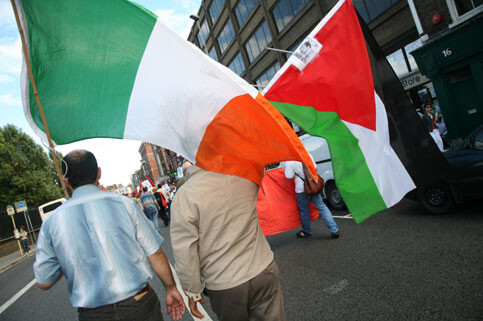
All across Ireland people are out on the streets, cultural institutions are refusing to take sponsorship from the hafrada (apartheid) state and senior members of the Oireachtas (Irish parliament) are calling for sanctions against Israel. The Irish Intifada has finally arrived.
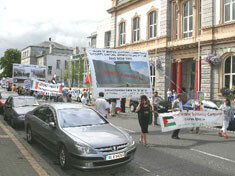
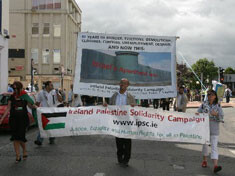
Since the attack by Israel on a beach in the Gaza Strip which killed 7 members of one family the conflict in the Middle East has spiralled out of all control. Hamas responded to the Gaza beach bombing by announcing an end to its unilateral fifteen month ceasefire and carrying out a legitimate military operation (in terms of international law) against a Military Watchtower of the occupying power, inside the Gaza Strip, at Karem Abu Salem. Israel’s response was immediately disproportionate and targeted civilians. Thus, it broke the two most fundamental rules of international law.
For a time it even seemed as if even the people of the world were with Israel - they had forgotten that for some years they had, rightly, been calling on Hamas not to bomb civilian targets. Then, absurdly, when Hamas carried out an attack against a legitimate military target governments and people alike condemned this military operation. While you may dispute the moral justification of a violent attack you can not dispute the legal legitimacy of fighting, inside occupied territory, against the soldiers of the occupying power.

But just as the scale of Israel’s response in Gaza was unfolding - and people were beginning to question that response - Hizb Allah carried out an attack inside Israel’s southern border. Again the true nature of the racist Israeli state was borne out. Instead of running a special-ops based operation to recover the soldier the Israeli elites sacrificed the safety of the three Prisoners of War and launched a massive series of attacks across Lebanon, butchering civilians.
Hizb Allah responded with indiscriminate rocket fire which recklessly endangered the lives of Israeli civilians - especially Arab-Israelis who do not have the same protection from Early-Warning systems and Bomb-Shelters that Jewish-Israelis have.
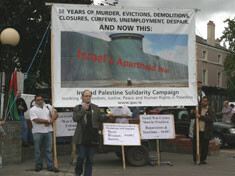
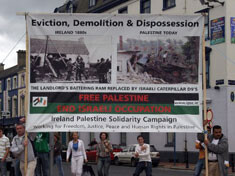
As the conflict bore itself out feelings on the streets of the West escalated in response. Anger, frustration and the belief that something must change has brought hundreds of thousands of people onto the streets of Europe. No where has this been more obvious then in Ireland where Trade Unions, NGOs, Solidarity Campaigns and Anti-War groups have been bringing people onto the streets in their thousands.
Demonstrations have taken place almost every second day in Dublin, across the streets of Ireland’s capital and outside the Israel and US embassy. A powerful element of these demonstrations have been the participation of members of the Lebanese, Palestinian and also Israeli communities in Ireland. Candle lit vigils, “die-ins”, demonstrations with music and poetry have been seen alongside fiery political speeches and heartfelt pleas for justice and for peace.
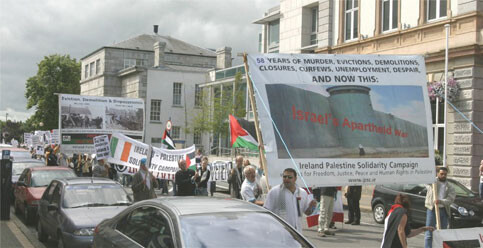
But this powerful anti-war work is certainly not confined to Dublin - the West, the North, the South are all awake. That dangerous combination of possibility and anger, of opportunity and frustration are spilling onto the streets of Galway, Belfast, Cork and Limerick as well.
In the Oireachtas (Parliament) the Foreign Affairs Committee held a special session to discuss the current Middle East crises. A unanimous motion was passed, even by supporters of the government parties, which called for: an immediate ceasefire, for Ireland to push the suspension of Israel’s trade privileges under Article 2 of the EU-Israel Association agreement and for Israel to compensate Lebanon and the UN for its military activities and killing of civilians.
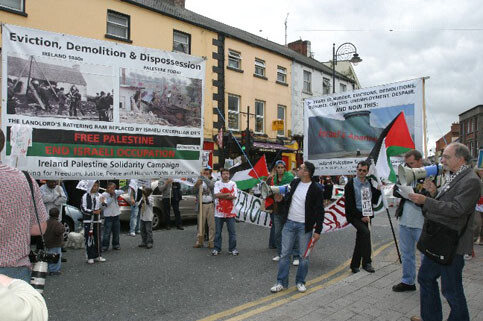
This unprecedented motion set the stage for other activities - a number of cultural festivals have decided to drop or reject Israeli sponsorship of their cultural programmes. Most notable among them is the Irish Film Institute - the country’s premier cinema - which had received sponsorship from the hafrada (apartheid) state as part of its Gay and Lesbian Film festival. The IFI has very publicly decided to drop the sponsorship stating that
“The decision is taken in light of the current activities of the Israeli government and prompted by the performance of your ambassador in explaining these acts to the Irish public. It is important for us to separate the screening of an Israeli feature film from activities of the Israeli government. In allowing the screening to go ahead, this is not an act of artistic censorship, something we would be loath to do.”
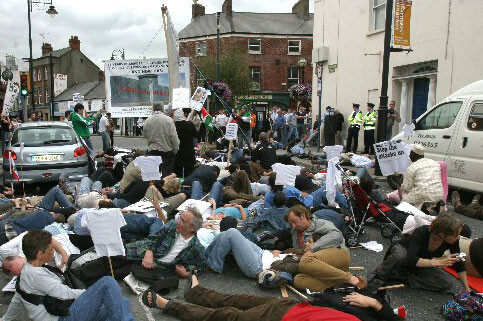
The brave decision is a validation of a long-standing campaign run by the Ireland-Palestine Solidarity Campaign which has been working for a cultural boycott of Israel. Although there have been some prominent and well publicised actions this is the first time a notable cultural institution has decided to refuse sponsorship from the Israeli establishment which operates a multi-layered system of hafrada (apartheid) on Palestinians who live inside Israel, inside the Occupied Palestinian Territory and the 5 million refugees who are forbidden from returning to the homes they were expelled from in 1948 and 1967.
Many criticisms of the media still abound - many of them wholly legitimate. The Irish media immediately attached itself to the narrative proposed by the Israeli PR machine. They spoke of ‘kidnap’ rather then capture. The main sources of information - RTE (the ‘trusted’ state broadcaster) and the Irish Times seemed happy to use biased pro-zionist Israeli journalists in producing their reports.
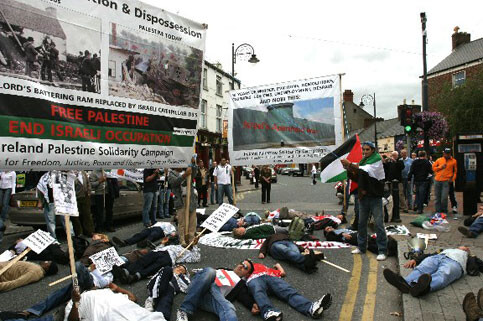
A number of brave voices stood out as exceptions though - Aoife Kavanagh on the main morning news show ‘Morning Ireland’ was not afraid to ask the Israeli ambassador (and others) difficult questions. Prime-time radio presenter Tom McGuirk practically hung up the phone on the belligerent Israeli ambassador the day after the Qana massacre. Similarly, some brave voices have even featured in the generally pro-Israel Irish Times- Tom Clonan, the security correspondent, who served as an Irish soldier in Lebanon has picked apart the ludicrous military claims made by Israel to justify its attacks on civilians. The main cartoonist Martyn Turner has been sharp, poignant, and scrupulous in his attacks against the Israeli war-machine.
Demonstrations will continue across the country over the coming days and campaigners hope that now that the world is witnessing the true face of the hafrada state that more cultural institutions, more members of the media, more politicians and more members of the public will become engaged with the global struggle for human rights of the Palestinian people and against Israel’s hafrada (apartheid) system.
Pictures credited to Paula Geraghty, Tom Dunloe, the Ireland-Palestine Solidarity Campaign, Irish Anti-war Movement and Trocaire.
Related Links


